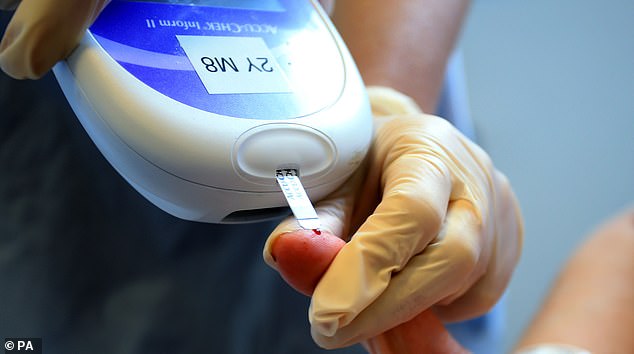Type 2 diabetes warning as shock figures suggest a MILLION Brits are unaware they have the condition
A million people in England are living with undiagnosed type 2 diabetes, figures suggest.
Survey data shows that seven percent of over-16s show signs of the condition, but a third go undiagnosed, according to the Office for National Statistics (ONS).
Younger people with the condition, which causes blood sugar levels to become too high, were more likely to go undiagnosed.
People with type 2 diabetes were also less likely to be diagnosed if they were otherwise in good health.
Charities called the figures ‘shockingly high’ and urged people with symptoms to get tested and treated as early as possible to avoid ‘devastating complications’.
Nearly 4.3 million people were living with diabetes in 2021/22, according to the latest figures for Britain. And another 850,000 people have diabetes and are completely unaware of it, which is worrying because untreated type 2 diabetes can lead to complications including heart disease and stroke.

Symptoms of the condition, which is diagnosed with a blood test, include excessive thirst, fatigue and increased urination. But many people have no signs
The ONS findings are based on the Health Survey for England 2013 to 2019, which surveys around 8,000 adults and 2,000 children about their health every year. They have their blood and saliva samples taken.
A total of 999,700 are believed to have undiagnosed type 2 diabetes, while an estimated 5.1 million have pre-diabetes.
Half of people aged 16 to 44 had not been diagnosed, compared with 27 per cent aged 75 and over, the ONS said.
People with type 2 diabetes and good general health were also more likely to be undiagnosed, as were slim women with smaller waists who were not prescribed antidepressants, it found.
ONS figures also showed that pre-diabetes – when blood sugars are higher than normal but not high enough for a diabetes diagnosis – affects around 5.1 million adults in England.
Those most likely to develop the condition had risk factors for diabetes, such as being overweight or older.
However, the ONS said there was a ‘significant prevalence’ in people considered to be at low risk of pre-diabetes, including 4 per cent of people aged 16 to 44 and 8 per cent who were not overweight or obese.
Those from black or Asian groups also had more than double the risk of pre-diabetes: 22 percent, compared with 10 percent of people from white, mixed and other ethnic groups.
Type 2 diabetes was higher overall among black and Asian people: 5 percent.
Analysis by the charity Diabetes UK in 2023 estimated that 4.3 million people in Britain were living with a diabetes diagnosis.
It previously calculated that 850,000 people were undiagnosed, based on diabetes prevalence modeling and projections from Public Health England in 2016.
Type 2 diabetes occurs when the body does not produce enough insulin, which is needed to lower blood sugar levels.
If you have high blood sugar over time, it can cause heart attacks and strokes, as well as problems with the eyes, kidneys and feet.
Patients may need to revise their diet, take medications daily, and have regular checkups.
Symptoms of the condition, which is diagnosed with a blood test, include excessive thirst, fatigue and increased urination. But many people have no signs.
Nikki Joule, policy manager at Diabetes UK, said: ‘Type 2 diabetes is a life-changing condition that often develops slowly, especially in the early stages when it can be very difficult to recognize the symptoms.’
She added: ‘The figures published by ONS today show a shockingly high number of people living with undiagnosed type 2 diabetes, while millions more are at high risk of developing it.
‘We are particularly concerned about the prevalence of pre-diabetes and undiagnosed type 2 diabetes in people from black and Asian backgrounds, and the worrying proportion of younger people who are undiagnosed, because we know that type 2 diabetes is more aggressive in younger people.
‘The findings are a reminder of how important it is that type 2 diabetes is detected and diagnosed as early as possible so that people can receive treatment and support to reduce the risk of devastating complications and, importantly, remission programs can be offered where necessary. .’
